| |
This page is devoted to promoting some players
of mbira and other traditional lamellaphones. The artists are
in no particular order other than grouping by instrument.
This page is no longer updated due to time constraints.
Check out ZimFest
- An annual festival of Zimbabwean music in North America!
Players of Various Mbira from
Zimbabwe & USA

Cosmas
Magaya - mbira dza vadzimu
(born 1953)
Cosmas Magaya is leader of the mbira
ensemble Mhuri yekwaMagaya. He is an internationally
recognized mbira player and teacher. Cosmas has been
an avid student and player of mbira dza vadzimu from
the time he was eight. Mr. Magaya is a master of the
instrument, having studied with many great players.
He has performed with the renowned Mhuri yekwa Rwizi
mbira group for over 25 years, participating with them
in concert tours of Europe and the US. He was instrumental
in the writing of Paul Berliner's The Soul of Mbira
in the 1970s, and continues to work closely with Dr.
Berliner as a consultant on Zimbabwean music. Located
in Harare, Zimbabwe.
|
|
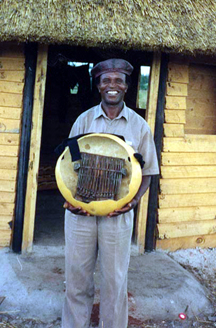
David
Gweshe - munyonga
David Gweshe is a true pioneer of Zimbabwean
music, constantly expanding the boundaries of traditional
Shona music. Born in 1940, Sekuru Gweshe comes from
the Budya people, a subgroup of the Kore-Kore. He is
a descendant of Nohoreka, the first of the Budya people
and the founder of the Shumba totem originating in Tanganyika
(Tanzania). He began playing njari at age 14 and over
time added keys to the njari in order to "play
all the parts" of the music that he heard in his
head. This is how Gweshe devised his own personal type
of mbira, the Munyonga, featured on his CD Mhuri
YekwaNohoreka. The songs on this recording are
mainly played at religious functions in which the music
is used to summon ancestral spirits. Gweshe is a spiritual
leader who has an important message for the people of
today.
|

Beauler Dyoko - mbira dza vadzimu
She is leader and featured singer with
the popular contemporary mbira ensemble, The Black Souls,
and has regularly been invited to perform a traditional
song to open the Zimbabwean Parliament. She has also
performed with Mhuri yekwa Rwizi/Soul of Mbira groups
for many years in Zimbabwe and throughout the world.
Beauler is also a spirit medium, an
herbalist, fashion designer, and teacher of traditional
Shona cooking. Beauler is an active member of organizations
promoting women musicians in Zimbabwe, and has written
original songs in support of AIDS awareness and non-violence.
She is the sole supporter of a large extended family
of grandchildren, nieces and nephews in Zimbabwe.
|
|
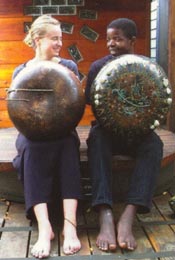
Hungwe
Jennifer Kyker & Musekiwa Chingodza
- mbira dza vadzimu
Hungwe is the Zimbabwe/US mbira duo
Musekiwa Chingodza and Jennifer Kyker. "Hungwe"
is a type of bird important to the spirits in Zimbabwe.
It is also the name for a black and white cloth worn
by spirit mediums.
Jennifer Kyker began to play marimba
in 1990 and mbira in 1992. She has lived and studied
in Zimbabwe for over three years. Jennifer has performed
with various artists in Zimbabwe and the United States,
including Kudana Marimba Ensemble, the Chigamba family's
group Mhembero, Wagogo, and Chris Berry and Panjea.
With Musekiwa Chingodza, she released the CD Tsunga
and also performed on Musekiwa's solo album Chingodza
Budai Pachena. Jennifer has been teaching at Zimfest
since 1995. She is currently working on a Ph.D. dissertation
in ethnomusicology at the University of Pennsylvania.
Musekiwa Chingodza is a well-known
Zimbabwean mbira and marimba player and teacher. He
was born in Zimbabwe into a family of great mbira players
in Mwangara village, Murewa, Zimbabwe in 1970. He began
playing mbira at the age of five and is self-taught.
Through listening to other gwenyambira, or great mbira
players, he developed a strong attachment to and love
for mbira music. He says, “Our music is both medicine
and food, as mbira has the power to heal and to provide
for people. Mbira pleases both the living and the dead.”
In 1991, Musekiwa was a key member of the band Panjea,
founded by Chris Berry. He composed the hit song “Ganda”
on Panjea’s Zimbabwean album. Currently, Musekiwa
teaches mbira at Prince Edward School in Harare. He
is an excellent singer, dancer, drummer, and he plays
both mbira dza vadzimu and nyunga nyunga. Following
up on Tsunga, his widely acclaimed CD with
Jennifer Kyker, Musekiwa released his CD VaChingodza
Budai Pachena. His newest CD, Kutema Musasa,
was released in 2005.
|

Newton Gwara - mbira dza vadzimu
Newton Gwara, often addressed by his
totem name, Matemai, is one of the very finest mbira
players alive today. With a silky voice often mistaken
for a woman's because of it's purity, and an mbira playing
style that is deceptively complex, Gwara can easily
bring forth the ancestral spirits for any ceremony that
he is called to play.
Growing up in the Mhondoro area and
moving to Dande as an adult, Matemai is well versed
in the many mbira styles in Zimbabwe, and is therefore
called upon to play at a wide variety of ceremonies.
He is often called to Dande to play mbira for Ambuya
Nehanda, one of Zimbabwe's most powerful spirits.
At an early age, Matemai got very sick
and was taken to a traditional healer. There, the healer
told his family that he was destined to be a great mbira
player and needed an mbira if his health was to return.
Matemai told me how as a child in school, he would be
sitting in class trying to concentrate. His teacher
would be at the chalkboard writing, but everything the
teacher wrote were lyrics to mbira songs! The teacher
then turned around, but the teacher had an mbira for
a head!
Newton Gwara is alsoone of the best
builders of mbir in Zimbabwe today, particularly of
tuned trio and duo sets of mbira dza vadzimu. In the
photo above, he is holding one of his recent inventions;
mbira dza vadzimu in Nyamaropa tuning with an extra
keyboard in dongonda above the right manual.
|
|

Chaka
Chawasarira - matepe & karimba
Chaka Chawasarira was born in Zimbabwe
on September 11, 1941. His father was a master drummer
and his mother was a dancer to the drum her husband
played. When he was nine, Chawasarira lost both his
parents and was brought up as an orphan in a Catholic
mission. He carried on his father's gift for drumming,
and in 1965 became a teacher at the mission school where
he had been raised. There he met a matepe player named
Mathias Chidavaenzi and was instantly drawn to the complexity
and power of the matepe music.
|
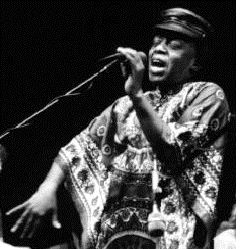
Abraham Dumisani "Dumi" Maraire
- nyunga nyunga (karimba)
(born 1944 - died 1999)
Maraire taught from 1968 through 1972
at the University of Washington in Seattle, contributing
to a flourishing of Zimbabwean music in the United States'
Pacific Northwest that continues into the 21st century.
He recorded some of the first recordings of Shona music
in the West.
|
|
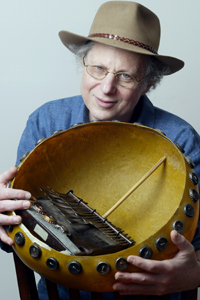
Paul
Berliner - mbira dza vadzimu
American mbira player who wrote The
Soul of Mbira: Music and Traditions of the Shona People
of Zimbabwe, one of the 1st descriptive books on
Shona mbira music in the 1970s. As a leading ethnomusicologist,
he published several articles on Shona music and both
his MA thesis and Ph.D. dissertation are on Shona music
& mbira. He was a faculty member at Northwestern
University in Illinois and now teaches at the John Hope
Franklin Center for International and Interdisciplinary
Studies at Duke University in North Carolina.
|
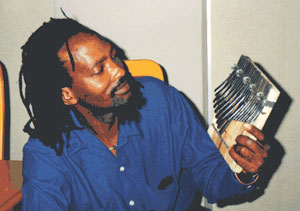
Sam Bvure - mbira dza vadzimu
One of Zimbabwe's very fine builders
of mbira dza vadzimu. Sam makes mbira in a variety of
tunings and also makes 15 and 19-lamellae karimba tuned
in duo sets. See the Zambuko.com
website for his instruments.
|
|
|
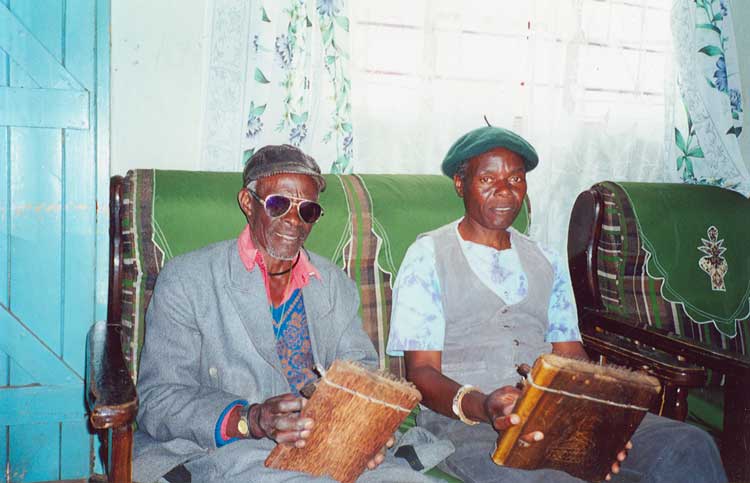
Sekuru
Gora & Sekuru Chigamba
-mbira dza vadzimu
Sekuru ('Grandfather') Gora, born Thomas
Wadharwa in 1937 and died March 10, 2002, was one of
the most famous mbira players of all time. If you go
to any corner of Zimbabwe and mention mbira, without
fail Sekuru Gora's name will come up. As a child, Gora
would constantly watch his grandfathers building and
playing the mbira. When he was fourteen he picked up
an mbira for the first time and, to everyone's amazement,
was already able to play. Even at that early age he
was called on to play at the mapira ceremony, where
a homwe (spirit medium) becomes possessed by an ancestral
spirit with the help of the mbira music. These ancestral
spirits guide and protect their living descendants.
Gora was a master at conveying a message in extremely
witty and sometimes biting ways.
|
|
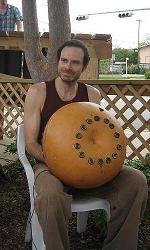
Joel Laviolette
- mbira dza vadzimu & matepe
American player and builder of many
types of very high quality mbira including mbira dza
vadzimu, mbira dza VaNdau, njari, and karimba. Joel
has researched many of the more rare types of mbira
and has a record company called Mhumi
Records that features CDs of many of those rare
mbira types. Joel is the director of the marimba band
Rattletree. Contact.
|
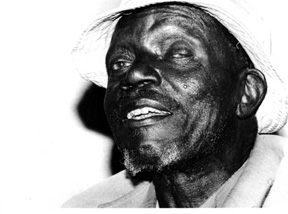
Sekuru
Simon Mashoko - njari
Sekuru Simon Mashoko was a legend and
was one of the first musicians to be recorded on the
mbira. He plays the njari, a 29 key mbira with unison
notes on the upper layer of keys. It is played with
both thumbs and index fingers and often the thumbs will
"strum" more than one key at once. He lived
in Nyika and hs recently passed away.
|
|
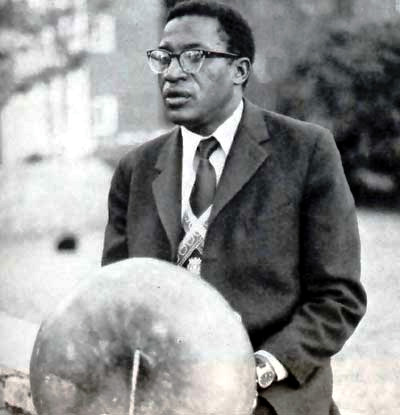
Hakurotwi Mude - mbira dza vadzimu
Hakurotwi Mude was a deeply spiritual
man and one of the most famous Shona singers until he
passed away. He used to make his living in the city
doing upholstery work for cars. He used to be the leader
of a professional group of mbira players, and he used
to perform in many contexts to invoke the spirits when
they are needed. The passion and quality of his powerful
performances put him in a league with other world-class
vocalists. He is the subject of the video Urban
and Rural Ceremonies with Hakurotwi Mude by Gei
Zantzinger, Les Blank, and Dr. Andrew Tracey.
|
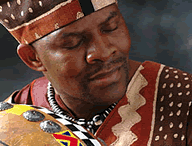
Solomon
Murungu - mbira dza vadzimu
Shona mbira player now living in Massachusets.
Solomon reguarly imports for sale many types of very
high quality mbira dza vadzimu and karimba in various
tunings from the best makers in Zimbabwe. His website
mbira store is Zambuko.com.
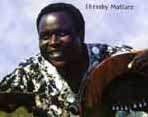
Sheasby
Matiure - karimba
One of the younger generation of Shona
nyunga nyunga (karimba) players. As a graduate of Kwanongoma
College of Music, he previously taught for some years
at Seke Teacher Training College, just outside Harare.
He has also acted as manager and artistic director of
the Zimbabwe National Dance Company. In 1999, Sheasby
was an artist in residence with the International Vocal
Ensemble at Indiana University, where he subsequently
graduated with an MA in Ethnomusicology. He is currently
at IU finishing a Ph.D. in ethnomusicology. Sheasby
is a highly respected musician, adept at teaching choral
singing, marimba, mbira, and hosho. He has conducted
workshops on the above in Sweden, Norway, Australia,
and the United States. He is currently teaching and
directing mbira and marimba ensembles at Indiana University.
|
|
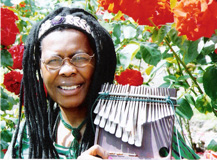
Stella
Rambisai Chiweshe - mbira dza vadzimu
Stella Rambisai Chiweshe is often called
- Her Majesty - The Queen of Mbira Music from Zimbabwe.
She is one of the first female mbira artists who gained
an international reputation and has been honored with
recognition in a music tradition that's been dominated
by men.
She is one of the few musicians in
Zimbabwe and Southern Africa who has been playing mbira
for more than 35 years and has worked as a traditional
mbira musician. When Zimbabwe was still an English colony,
Stella secretly was recognized as an mbira player at
forbidden ceremonies. Before the independence of Zimbabwe,
mbira instruments had to be kept hidden because the
colonial government had banned the instrument fearing
its magical powers. After playing through the whole
night at forbidden reunions, Stella then returned to
her every-day-struggle of survival as a young girl within
a colonial environment.
Stella Rambisai Chiweshe is nicknamed
"Ambuya Chinyakare" (Grandmother of Traditional
Music). She is a well respected and important woman
in the international music circuit. She set an example
for the rest of the women musicians in Zimbabwe. She
released more than 20 singles of mbira music in Zimbabwe
before independence. Her first single, "Kasahwa,"
went gold in 1975.
After Independence she was invited
to become a member of the original National Dance Company
of Zimbabwe, where she soon took the part of a leading
mbira solo player, dancer and actress.
|
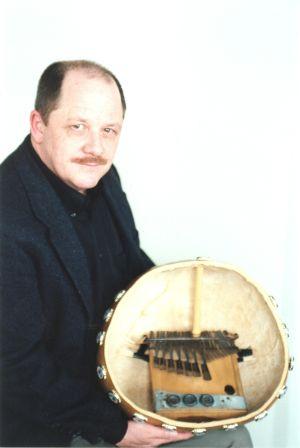
B.
Michael Williams
-mbira dza vadzimu & karimba
One of the top American mbira dza vadzimu
players in the USA. Michael also sings many of the traditional
Shona songs that mbira dza vadzimu accompany and has
pioneered a new useage of the instrument in his ensemble
BataMbira in which traditional Shona and Afro-Cuban
musics are played simultaneously. His book Learning
Mbira: A Beginning . . . (& several volumes
of downloadable mbira TAB) is one of the best published
pedagogical sources on mbira dza vadzimu for Western
percussionists. Dr. Williams teaches at Winthrop University
in South Carolina.
|
|
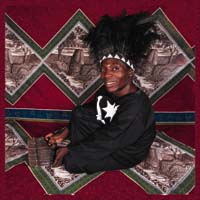
Forward Kwenda - mira dza vadzimu
He was born in the rural Buhera area
of Zimbabwe, and as a boy, Forward excelled in traditional
dance and recitation of ancient poetry. At the age of
10, he began to play ngoma (drums) and hosho (gourd
rattles) for his mother's gombwe (rain-making) spirit.
He was given the name "Forward" because of
his curiosity about many subjects, enthusiastic involvement
in many activities, and his singing for liberation war
freedom fighters.
At an early age, Forward borrowed an
mbira and, with no teacher other than occaisional radio
programs, began to play on his own. In 1984, Kwenda
moved to Zimbabwe's capital city of Harare and began
to play mbira with other musicians. Within a year, he
had formed his own mbira group and was making records
and performing on national radio, as well as performing
constantly at mapira ceremonies. During this period,
he was informed by powerful rain-making spirits that
he was to devote his life to playing mbira for their
ceremonies. He was particularly known as the teenager
for bringing the desired spirits to a ceremony by the
end of the first song he played at a ceremony.
In 1985, Forward began playing in a
unique complex style - much to the amazement of master
mbira players two and three generations his senior.
This style, considered in Shona culture to be "more
ancient" because spirits prefer it, was first recorded
in 1985 and 1986 by his American friend Glenn Makuna,
who dubbed Kwenda "the Coltrane of mbira."
In 1997, Kwenda toured the US with
Erica Azim, and recorded the Shanachie CD Svikiro:
Meditations of an Mbira Master. 1n 1999, a transcendent
field recording of Kwenda on a Zimbabwean mountaintop
at sunset was included on Ellipsis Arts' Trance
3 CD. In February 2000, Kwenda performed at the
Kennedy Center in Washington, DC toured North America
2000-2002.
|

Dan Pauli
- electric mbira dza vadzimu
American mbira player and builder of
acoustic and special stereo, solid body electric mbira
dza vadzimu with extended ranges and tunings. Dan also
builds and plays Shona marimbas.
|
|

Erica Azim -
mbira dza vadzimu
The most well know American female
player of mbira dza vadzimu. Erica has released several
of her own recordings as well as many recordings of
traditional Shona mbira players in all tunings. She
hold regular workshops across the USA in teaching mbira.
her website is Mbira.org.
|
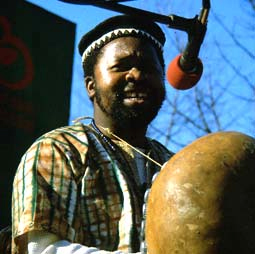
Ephat Mujuru - mbira dza vadzimu
Ephat Mujuru was raised in a small
village in Manicaland, near the Mozambiquan border,
and taught to play the mbira by his grandfather, Muchatera
Mujuru. Mujuru played all of Zimbabwe's five types of
mbira, but his specialty is the popular mbira dzavadzimu.
During the 1990s, Mujuru continued to travel and perform,
and in the United States, he recorded two albums for
Music of the World. Ancient Wisdom is a solo recording,
and Shona Spirit is a collaboration with another of
Shona music's great international ambassadors, Dumisani
Maraire. Mujuru also recorded an ambitious, multi-track
album he called Journey of the Spirit, which has yet
to be released. Back in Zimbabwe, he also released successful
pop albums with a revamped, electric version of Spirit
of the People. In 1992, Mujuru's first electric album
Hapana Mutorwa made its way to the top of the
local charts, edging out Zimbabwe rumba kings Leonard
Dembo and John Chibadura. But as conditions worsened
in Zimbabwe, Mujuru traveled and recorded less. When
he was last interviewed in March 2001, he had just finished
two new recordings, one acoustic, traditional session,
and one with a new band, members of a Zimbabwe rumba
outfit called Eden Boys. In early September 2001, the
electric album, Musiyano, was released and
got a very positive review in The Daily News
in Zimbabwe, under the heading, "Mujuru back with
a bang." Mujuru seemed poised for a genuine comeback.
But less than a month later, on October 5, he died in
London, while traveling with his cousins Fradreck and
Sam. He was on his way to begin a residency at Grinnell
College in Indiana. Sadly, Ephat Mujuru suffered a massive
heart attack that day in Gatwick Airport and died on
his way to a hospital.
|
|
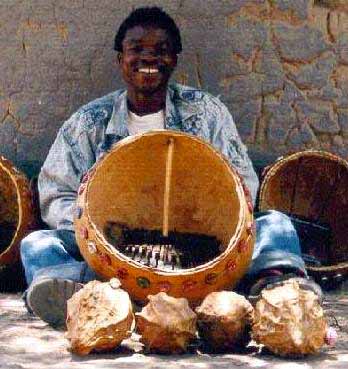
Garikayi Tirikoti - mbira dza vadzimu
Born into a traditional Shona family
of the Mazumbakupa (Zebra) clan, Garikayi started playing
the mbira Dzavadzimu at the age of 4. By the age of
7 he was already a well regarded performer at Biras
(all-night ceremonies in which mbiras are played to
call upon the spirits for healing, help, or guidance).
Garikayi has a very distinctive style and is considered
to be an innovator of mbira music. He created his own
mbira style after one of his ancestral spirits visited
him in a dream. He is known for playing a variety of
sizes of mbira in tuned sets so that his ensemble is
a true mbira orchestra. He is also a well respected
builder of mbira.
|
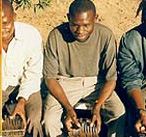
Ngoni Makombe - mbira dza vadzimu
(born c. 1970 - died 2004)
Ngoni Makombe is a less known by name,
but his artistry on the Shona mbira dza vadzimu can
be heard on many recordings along with his brother,
Bezil Makombe, by Thomas Mapfumo and the Blacks Unlimited
since 1988, in the early period of the band when they
first incorporated mbira as a permanent fixture of the
ensemble.
Ngoni was born in Seke, south of Harare,
possibly in 1970. His father died when he was young.
His mother struggled to care for a large family in their
rural home where they grow maize and keep animals. Ngoni
and his brother Bezil played mbira ceremonies in and
around Seke, and this is how they came to the attention
of Thomas Mapfumo. Bezil Makombe was the first to join
the band, and Ngoni Makombe soon followed. Both brothers
made an enormous difference, both enriching the sound
of the band and providing raw material for songs that
became Blacks Unlimited classics.
|
|

Kuridza Mbira Project - mbira dza vadzimu
|
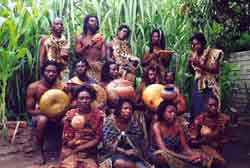
Mbira
DzeNharira - mbira dza vadzimu
Mbira DzeNharira is a seven piece mbira
group that plays the "mbira orchestra" made
popular by Garikai Tirikoti. Lead by Wilferd MaAfrica
and Tongerai Bangure, they are a musical powerhouse
that has made them the only traditional mbira group
to reach the ZBC number one slot on the popular music
charts. Their tight harmonies and singing about modern
issues as they relate to the spirit have touched many
of the younger generation in Zimbabwe and helped vitalize
the mbira scene for everyone.
|
|

Chiwoniso Maraire
- nyunga nyunga (karimba) &
mbira dza vadzimu
American born Shona singer and player
of nyunga nyunga and mbira dza vadzimu and daughter
of the great Shona musician Dumisani "Dumi"
Maraire. She is known for mixing elements of hip hop
with Shona music and a seamless mix of Shona and English
singing/lyrics in her performances. Located in Zimbabwe.
|
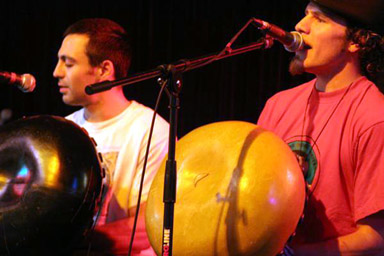
Pachi Pamwe - mbira dza vadzimu
American band featuring mbira dza vadzimu
players Eric Miller and Bud Cohen who write original
songs with mbira, guitar, trumpet, and drumset accompaniment.
|
|
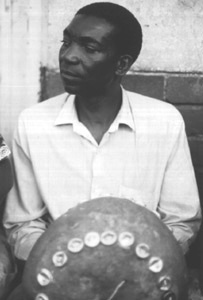
Mondreck Muchena - mbira dza vadzimu
(born c. 1939 - died 1995)
See the Dandemutande
site for more on Mondreck Muchena.
|

Fradreck Mujuru - mbira dza vadzimu
One of the great Shona mbira dza vadzimu
players and builders in Zimbabwe and cousin of Ephat
Mujuru. Fradreck Mujuru, of the Maungwe Clan, was born
October 31, 1955, in Dewedzo, Rusape, Zimbabwe. At the
age of eight, Fradreck pestered Joseph Chidemo to teach
him how to play. In 1972, Fradreck was accepted into
the prestigious circle of mbira musicians at Dambatsoko
who played for Muchatera. Among them were Ephat, Fungai,
Samuel, Munyaradzi, Komboni, Musekiwa and Killian Mujuru;
Fradreck and Cletos Manjengwa and Charles Mutwira. He
is one of the mbira players that kept the tradition
going during the later years of the British occupation
right up to independence.
|
|
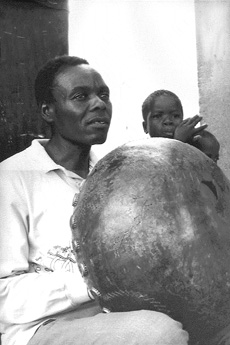
Tute Chigamba - mbira dza vadzimu
A great Shona mbira dza vadzimu player
and maker known for his playing in gandanga tuning.
He was one of Sekuru Gora's students.
|
|
|
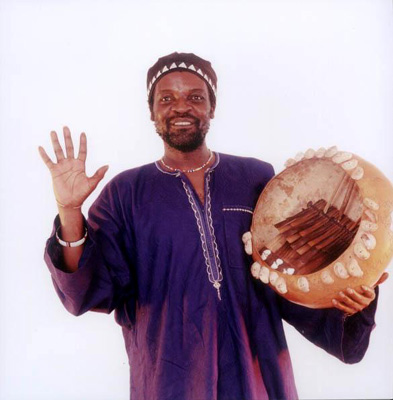
Chartwell Shorayi Dutiro - mbira dza vadzimu
Shona mbira dza vadzimu player who
was one of the first mbira players with Thomas Mapfumo
and the Blacks Unlimited in 1986. He is currently based
in England where he performs with the ensemble Spirit
Talk Mbira.
|
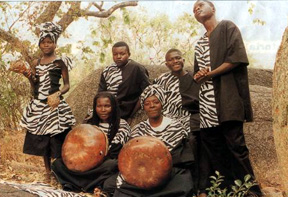
Kunzwana Mbira Group
- mbira dza vadzimu
Judith Juma and Rhoda Dzomba have been
performing together as Kunzwana Mbira Group in Zimbabwe
since 1983. They became popular through their performances
at traditional ceremonies, and have just begun to reach
a wider audience. Kunzwana Mbira Group is special because
it is rare to find two women with such an exceptional
talent who have bonded to perform traditional mbira
music. Kunzwana Mbira Group recently expanded in 1998
with Judith Juma's children who have grown up inspired
by the traditional mbira music. Her sons Dingiswayo
and Dingani, with her daughter Spiwe, alternate playing
shakers, mbira, dancing, and singing during performance.
Kunzwana
Mbira Group CD.
|
|

Mashozhera
Mbira Group - mbira dza vadzimu
Victor Matanga, the leader of Mashozhera
Mbira Group, began playing the mbira at the age of 11,
and quickly became one of the most sought after players
in the Chihota/Nyandoro area. This group highlights
how mbira is dance music! The group now all live at
a commercial farm outside of Harare and are usually
playing ceremonies during the weekend.
|
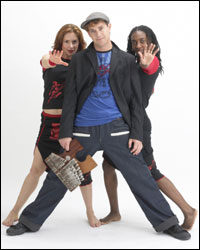
Chris Berry & Pangea - mbira dza vadzimu
American mbira dza vadzimu player and
pop songwriter who fronts the band Pangea (Ben Sands
is another mbira player that used to play with this
group). Chris moved to Zimbabwe and studied mbira with
Monderek Muchena for 10 years and became a successful
pop artist in South Africa. He also studied with Congolese
drummer & likembe player Titos Sompa. Chris is now
located in New York and is a very successful songwriter
and tours all over with his band.
|
|
|
ChiSanza Players from Mozambique
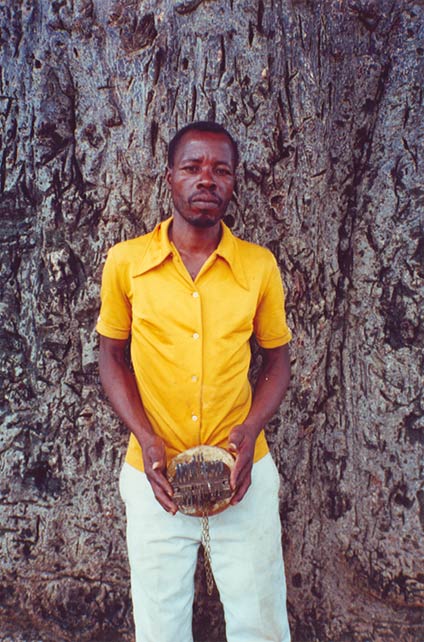
Simeos
John Pemba - ChiSanza
The ChiSanza is similar to the nyunga-nyunga,
but has 22 keys (instead of 15). It is played with just
the thumbs, held against a small goard with an animal
hide attached to it. There is a stick that props the
body of the ChiSanza against the animal skin, turning
it into a small soundboard to amplify the sound. Even
though only playing with two fingers, John Pemba can
easily play three or four simultaneous melodic lines
as well as singing. Also, due to the extra notes, listeners
may notice the similarity to the repertoire of the larger
mbira of Zimbabwe.
|
|
|
Ilimba & Chirimba Players
from Tanzania
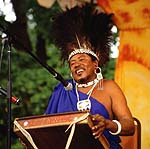
Hukewe Ubi Zawose - ilimba & chirimba
(born 1938/1940 - died 2003)
Dr. Hukwe Ubi Zawose grew up as a cattle
farmer and was a member of the Wagogo people in Tanzania.
Without any formal education besides a few days in a
mission school, as a singer his voice stood apart from
others. He traveled far leaving legends of his astonishing
voice everywhere he went and learned to play ilimba
(giant lamellophone), chrimba (smaller lamellophone),
izeze (traditional violin), filimbi (traditional flute),
and nguga (ankle bells). He also began to modify some
of his instruments, and to write and perform his own
compositions along with the traditional story-based
songs and the political celebration songs of his culture.
Fantastic stories about his musical abilities were believed
throughout Tanzania includsing that Zawose is an immortal,
or a divine creature; and that Zawose's voice possessed
magical healing powers. Some of the myths about his
voice may have to do with him being one of the few singers
in continental Africa that employ the technique of overtone
or throat singing in which a single performer can produce
multiple pitches simultaneously with the voice.
In response to these rumors, Zawose
created a grand persona. When performing on stage, he
and his band began to don elaborate masks and costumes.
Throughout the 1970s and 1980s, Zawose and his band
performed all over Tanzania. In 1991, he recorded with
the group Tatunane on the CD Afrobrazz. In
1996, the first Zawose album available in the West was
released. Chibite (on the Real World label),
is a mix of Zawose's own songs and traditional Tanzanian
compositions.
In reality, Hukwe Zawose lived a traditional
Tanzanian life with his 7 wives and 40 children until
his Aids-related death in 2003. During his lifetime,
he was awarded an honorary doctorate in music from the
Finnish Sibelius Academy.

|
|
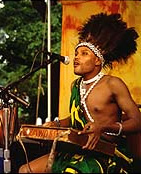
Charles Zawose -ilimba & chirimba
(born 1970 - died 2004)
A talented Tanzanian ilimba player
who worked with his uncle Hukwe Ubi Zawose until his
tragic death in 2004. Charles Zawose was initially headed
for a simple life, farming the arid country surrounding
the village of Wakili, near Dodoma in central Tanzania.
Around the time of his birth in 1970, Hukwe Zawose had
moved to the coastal town of Bagamoyo, where he founded
the celebrated College of Performing Arts, later touring
internationally with his colleagues Dickson Mkwama and
Lubeleje Chiute as the Master Musicians of Tanzania.
With the death of his uncle's 2 closest musicians, Charles
moved to Bagamoyo in the early 1990s and began a partnership
with Hukwe, who chose him as his gifted protege, above
even his own sons.
Charles Zawose would usually accompany
his uncle's extraordinary five-octave voice with his
own beautiful vocal harmonies, as well as playing the
ilimbaand the izeze. Dressed in extravagant costumes
made from goatskins and porcupine quills, with ostrich
feather head-dresses and nguga ankle bells, the pair
were a regular fixture at Womad festivals in Britain
in the late 1990s, charming crowds with their humorous
and theatrical interplay. They reached an even bigger
audience opening for Peter Gabriel, on his Growing
Up tours of 2002-2003.
Charles Zawose made several CDs with
Hukwe Zawose, including Chibite (1996) and
Assembly (2001), the latter album a daring
collaboration with the Canadian producer and musician
Michael Brook. In 2002, they released the Womad Select
CD Mkuki Wa Roho (A Spear to the Soul), the
first to feature one of Charles's compositions; "Tumieni
Ujuzi" ("Use the talent God has given you"),
which has been interpreted as a rebuff to members of
the Zawose clan passed over in favour of Charles.
A more experimental solo album which
Charles Zawose had begun recording remains uncompleted.
Charles Zawose, singer and musician:
born Wakili, Tanzania 3 July 1970; five times married
(one son, two daughters); died Stockholm, Sweden 24
October 2004 of Aids-related causes. Director John Simpson's
documentary film Lay Down Your Hearts about
the Zawose Family's musical dynasty.
|
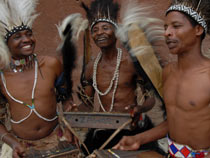
The Zawose Family - ilimba & chirimba
Surviving members fo the families
of Hukwe Ubi Zawose and Charles Zawose now carry on the musical
legacy started by Hukwe and Charles. They all play ilimba and
other traditional Wagogo instruments and sing in a style reminiscent
of Hukwe Zawose. In 2002, John Simpson made a documentary film
on the Zawose Family. The label Real World has released their
debut CD called Things Fall From The Baobob Tree in
2007.
Likembe Players from Democratic
Republic of Congo
Antoine Moundanda of Likembé Géant
-likembe
Formed by Antoine Moundanda, Likembé
Géant is one of the great traditional
bands from the Democratic Republic of Congo. They play
a traditional style of music that, to Western ears,
has the sounds of Cuban rhumba.

Antoine Moundanda
-likemba (also known as kisansi)
International recording artist and
master likembe/kisansi player, Moundanda has toured
throughout China, Russia, Africa and Western Europe,
spreading his traditional and contemporary music from
the heart of the Congo. His rhumba, salsa, blues and
traditional soukous styles have ignited audiences from
Havanna to Brazzaville and back to Congo Square.
|
|
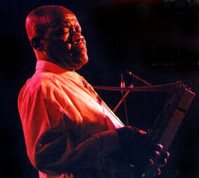
Mawangu Mingiedi
-electric likembe
In the 1970s, Angolan musician Mawangu
Mingiedi, or simply Papa Mingiedi to his fans, took
his likembe to Kinshasa. His son, Aharon Natondo, says
his father was an instant hit on the streets of Congo's
(Zaïre) capital.
Papa Mingiedi formed a band, mostly
made up of his sons and nephews, and recorded an LP
with a French engineer. The then-nameless band got some
play on the radio in France and caught the ear of Brussels
music producer Vincent Kenis. Over the next 20 years,
Kenis sought the unnamed Congolese band he had heard
once. Kenis finally found the group in 2000 after three
trips to Kinshasa in search of it. This group became
Konono No. 1.
|

Muyamba Nyunyi
-bass likembe
Muyamba Nyunyi and Kabongo Tshisense
(Masanka Sankayi's two front-men) have been together
as a duet since the Seventies. Dancers, singers, story-tellers,
their wry sense of humor comes out best in Tshiluba
but also in French : check the CD Congotronics 2
for Kabongo's very own rendition of a XVII century fable
by Jean de la Fontaine. Muyamba is also an excellent
bass likembe player.
|
|
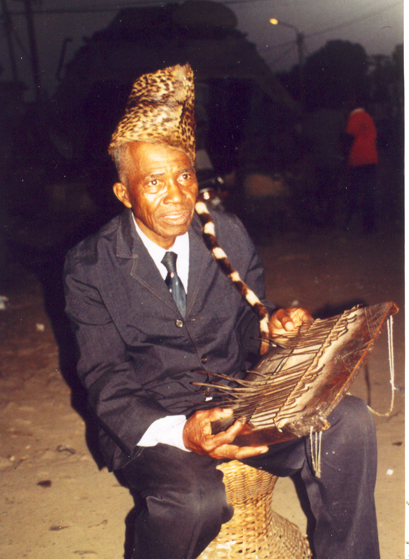
Papa Kourand - likembe
A close friend and associate of Antoine
Moundanda, Papa Kourand has toured with the Likembé
Géant band for more than twenty years.
|
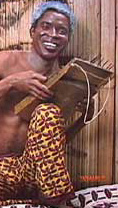
Papa
Titos Sompa - likembe
One of the first Congolese musicians
to come to the USA. Titos is from Brazzaville in the
Democratic Republic of Congo, and is a great likembe
player, dancer, drummer, and singer and has recorded
with many of the great American jazz musicians of the
recent past. His website is Mbongi
Village.com.
|
|

Konono No. 1 - electric likembe
Formed by Mawangu Mingiedi,
Konono No. 1 is an amzing group from Kinshasa in the
Democratic Republic of Congo. They play electrified
likembe and home-made percussion from found objects.
Their sound system is home-made as well. Their sound
features a lot of distortion and this group has become
a curiosity among rock musicians in Europe where they
recently tour. This group has several CDs out and has
just recorded with Bjork. Their recordings are availablke
at the Crammed
Disc website.
|
Sanza & Kalimba Players from
Cameroon

Pierre
Didy Tchakounté - sanza
Pierre Didy Tchakounté is a
Cameroonian singer, guitarist, and sanza performer who
popularized the mangambeu urban music style in the 1970s-1980s
in Cameroon. He recorded under his own name and as Pierre
Didy Tchakounté and The Black Tulips. His ensemble
played mangambeu and a kind of 1970s Afro-funk/disco.
He played both the traditional sanza with wooden lamellae
and a more modern one with metal lamellae. He contributed
music to the soundtrack of the film Suicides
in 1983. He now lives and performs mostly in Paris,
France.
|
|
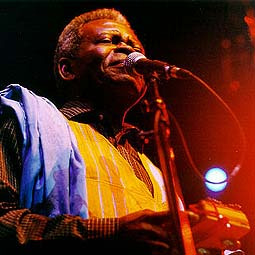
Francis Bebey - sanza
(born 1929 - died 2001)
Cameroonian multi-instrumentalist who
plays a generic sanza to accompany himself while singing
original songs. Beybey is known for doing his own music
but has synthesized a variety of traditional African
musical instruments and styles including pygmy hindewhu,
Central African Rebulic sanza, Ghanaian highlife palmwine
guitar, among others. His 1982 recording African
Sanza is a set of original songs set to sanza accompaniment.
|
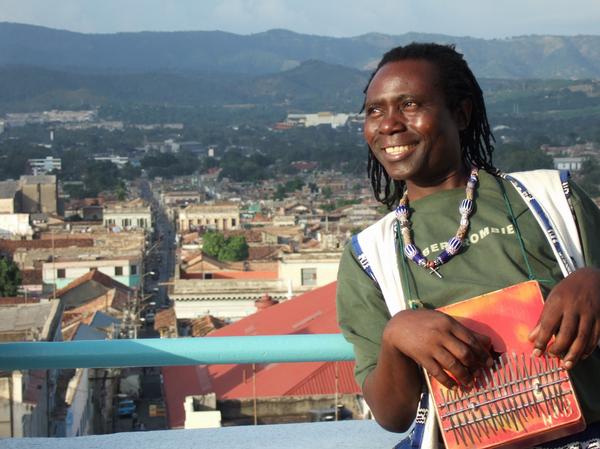
Njacko Backo - kalimba
Cameroonian singer and percussionist
who plays kalimbas in his band Kalimba Kalimba in Toronto,
Ontario, Canada. His band plays a pan-African influenced
urban music and has been in Canada since 1990. Njacko
also plays with another group known as The Toumkak Drummers.
|
|
|
Kongoma Players from
Sierra Leone
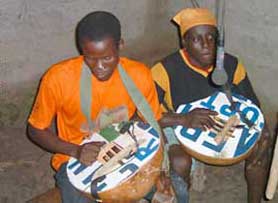
A pair of Temne kongoma players
from Suctarr in Sierra Leone. These instruments are
used in a traditional musical style known as kagbe.
The players are Bai Bangura (on the left) and Mohamed
Kargboh (on the right).
Kalimba Player, originally
from Uganda
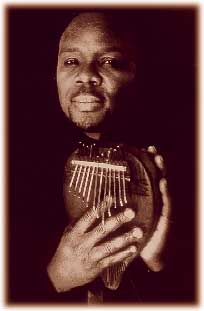
Samite Mulondo
- kalimba
Samite plays a generic lamellophone
he calls kalimba. He was born in Uganda (where lamellophones
called kadongo are played) but was raised in Kenya.
Samite is known for performng his own music in which
he often accompanies himself on a generic kalimba. Located
in New York.
Rhumba
Box Player from Jamaica
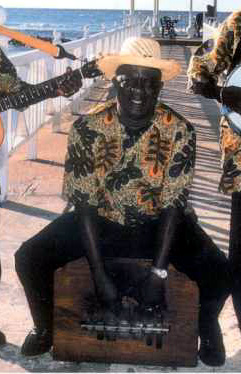
James Convery - rhumba box
Rhumba box player with the Jamaican
mento band The Triangles in the 1960s.
|
|
Kondi Player from Sierra
Leone

Sorie
"Kondi" Koroma
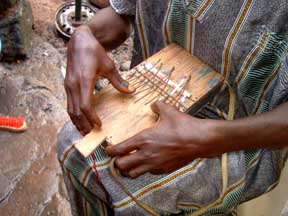
Sorie "Kondi" Koroma was
born in the village of Mangiloko, near the city of Makeni
in Sierra Leone, West Africa around the year 1968. His
actual birthdate is not certain because there is no
official record of his birth. His country ranks as one
of the three poorest countries in the world in terms
of infant mortality, life expectancy, per capita income,
health care, and infrastructure. He never went to school
but began to play the kondi, a traditional
lamellaphone of Sierra Leone as a teenager. It was apparent
early on that he had a special talent for music, and
by 1984 he started earning some small money by playing
at ceremonies and travelling to nearby villages.
Being born blind in such a poor country
and never receiving any formal education would seem
like enough hardship by itself. But then his life was
uprooted in 1996 when civil war forced him to leave
his home and seek refuge in Freetown. Despite the ongoing
war, he began recording his first album there in 1998,
and finished it after 4 months. But on January 6, 1999,
the rebels staged a brutal assault on Freetown called
Operation No Living Thing. Almost all the city’s
residents fled to the bush. Sorie was abandoned, forced
to hide inside his house for 5 days while much of the
city was looted and burned down. When the dust settled,
the master tapes had been lost and his career plans
derailed. He decided to remain in the capital city,
in a neighborhood called Fourah Bay, renting a one-room
shack perched on a dangerously steep hill (dangerous,
that is, even for a sighted person).
Having lost his chance to commercially
release a cassette, Sorie "Kondi" made a name
for himself (literally, he adopted the name of his instrument
as his surname) as a street musician. Unfortunately,
this profession doesn’t bring in much money in
a country where almost everybody is living in poverty.
But a trip in 2006 to the Lungi region, across the bay
from Freetown would provide Mr. Kondi with a golden
opportunity to put his career back on track.
By chance, an American recording engineer
named spotted him playing his kondi and was
immediately impressed. The next day, he was asked to
be included in the anthology of Sierra Leonean music
he was working on, and they arranged to record a live
performance near the chief's compound in Tintafor. In
February 2007, a prominent Tintafor businessman by the
name of Ishmael Sesay heard this recording and liked
it so much that he decided to offer Mr. Kondi the chance
to immediately release it inside Sierra Leone. Mr. Kondi
was thrilled with the offer but said that he thought
an album recorded in a studio with other instruments
and backup vocals would be more appealing to the local
market. Without Money, No Family was released
in July 2007 by the Cassette Seller's Association of
Sierra Leone. That same month, Sorie was also featuredon
the original live recording as Music of Sierra Leone,
Vol. 3 on the EarthCDs label.
Sorie Kondi is a musical genius and
a cultural treasure, able to sing in four different
languages (Loko, his mother tongue, Temne, Krio, and
English). He is also an innovator; he taught himself
how to play kondi at the age of 15, later electrified
it, and developed a unique style of playing it. Hopefully
with this second chance at a recording career, he will
finally earn the recognition and support he deserves.
|
Lamellophone Builders:
David Bellinger
& eKalimba
Patrick Hadley,
Bill Wesley & Array Mbira
Joel
Laviolette
Zambuko.com
Andy Cox
Collins
Rhythmcraft
Joshua Edwards -
Dezes
Lucinda Ellison
- eMbira
Hugh Tracey
Kalimbas & Kalimba Magic
Zenobia
Music
|

